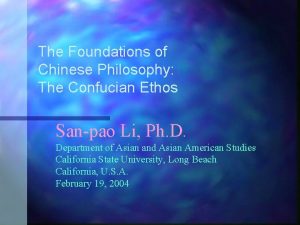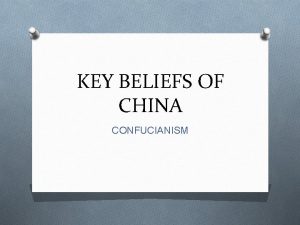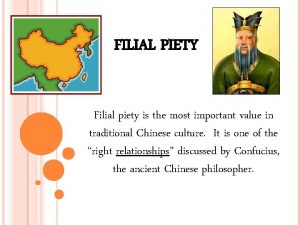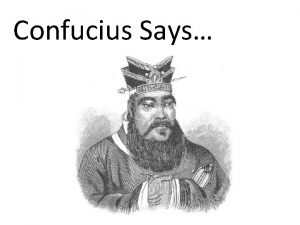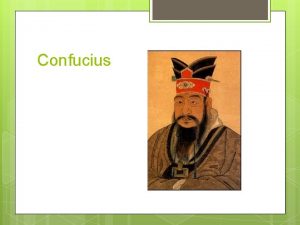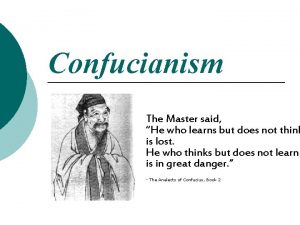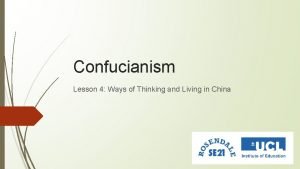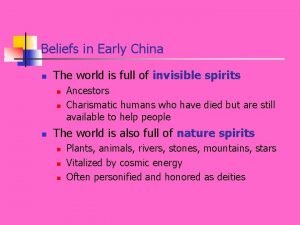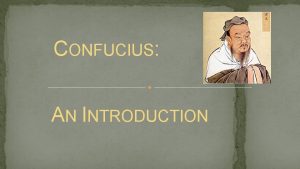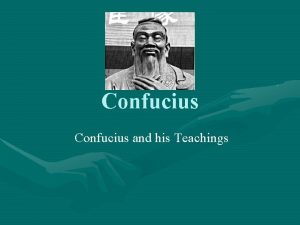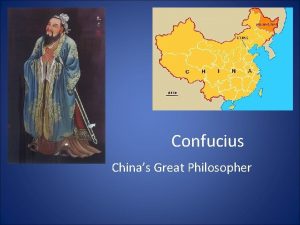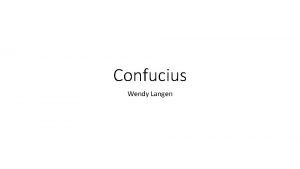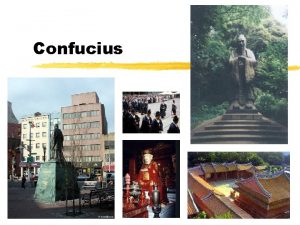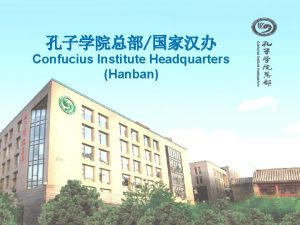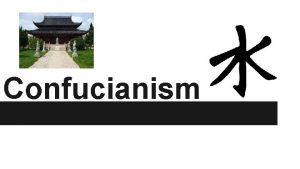The Life of Confucius Confucius was a Chinese














- Slides: 14

The Life of Confucius • Confucius was a Chinese teacher and philosopher. • He was the most famous and important of the early Chinese thinkers. • The Chinese called him Kong Fu Zi or “Master Kong. ” Confucius is the Latinized version of this name.

The Early Years • Confucius was born in 551 B. C. to a noble but poor family. • He loved learning and was mostly selftaught. • He hoped to advance to an important government office, but he never succeeded. Instead, he decided to try teaching.

A Pioneer Teacher • Many historians think that Confucius was China’s first professional teacher. • He charged students a fee to take his classes. • He taught the students his views of life and government. He was very dedicated. • Confucius searched for a ruler who would follow his teachings, but he couldn’t find one. • He died in 479 B. C. at the age of 73, believing his life had been a failure. He had no way of knowing that his teachings would be followed for many centuries.

Questions • What does this mean? “From the very poorest upward …none has ever come to me without receiving instruction. I instruct only a student who bursts with eagerness. ” –Confucius • What kind of students did Confucius like to teach?

The Teachings of Confucius • Confucius did not claim to be an original thinker. • He felt his role was to pass on the forgotten teachings of wise people from an earlier age. • In many of his teachings he tried to persuade rulers to reform. • He also hoped to bring peace, stability, and prosperity to China’s kingdom.

Confucianism • Confucius himself never wrote down his teachings, rather his students gathered a collection of his sayings after his death. • These writings made up a system of beliefs and values, or a philosophy. • That philosophy became known as Confucianism. It was one of several important philosophies of ancient China.

Bringing Order to Society • Confucius lived during a time of frequent warfare in China. • Powerful rulers fought one another for the control of land. They seemed more interested in gaining power than in ruling wisely. • Confucius hoped to persuade these rulers to change their ways. • The goal of Confucius was to bring order to society. • He believed that if people could be taught to behave properly toward one another, order and peace would result. Society would prosper.

Respecting Others • Confucius said that people ought to respect the people above and below them and treat others justly. • He described 5 human relationships: ruler and ruled; father and son; husband wife; older brother and younger brother; and friend. • Behavior: Confucius said that people in authority must set good examples. • He summarized his ideas about relationships in a simple way: “Do not do to others what you would not want done to yourself. ” • Does this sound familiar?

Religious Traditions • Confucius also functioned as a religion for many people. • Those who follow Confucianism are part of a moral community. • Give an example of 2 other groups that are part of a moral community? • Many ancient Chinese also practiced Confucianism alongside their existing religious traditions. • Most Chinese believed that life should be lived in harmony with nature. Happiness came from living a balanced life.

Religious Traditions Continued • A religious philosophy known as Taoism (DOW iz um) supported these ideas. • Taoism was based on the writings of Laozi (LOW dzuh), a Chinese thinker. • The Taoists loved nature, and they believed in leading simple and selfless lives. • Taoism sometimes would rival Confucianism for popularity in China. But overall, the teachings of Confucius would remain the most widely spread.

The Influence of Confucius • The teachings of Confucius came to have a major effect on Chinese government. • They became part of the basic training for members of the civil service. • The civil service is the group of people who carry out the work of government.

A Merit System • Before the ideas of Confucius took hold, government posts were generally given to the sons of powerful people. • Afterward, any man could hold a government post based on merit-on how qualified he was or how well he did his job. • Candidates for government jobs had to pass official examination based on the teachings of Confucius.

Rising to High Positions • Candidates had to know how to read to obtain a government job. This rule made it difficult for a poor man to enter the government, but it was not impossible. • Many talented but poor young men learned to read and rose to high government positions. • Confucius would have been surprised at the influence he had on China.

Questions 1. How did Confucius become a teacher? 2. Confucius would teach only those students who wanted to learn. How does this rule apply to your experience as a student? 3. What were the basic teachings of Confucius?
 Anglo chinese primary
Anglo chinese primary Confucianism values
Confucianism values Confucius timeline
Confucius timeline Confucianism beliefs
Confucianism beliefs Marco polo accomplishments
Marco polo accomplishments Confucius institute at moscow state linguistic university
Confucius institute at moscow state linguistic university Confucianism key beliefs
Confucianism key beliefs Why is filial piety important
Why is filial piety important Confucius says
Confucius says Where did confucianism begin
Where did confucianism begin It means goodwill, politeness, and generosity
It means goodwill, politeness, and generosity Confucianism teachings
Confucianism teachings What was the dominant philosophy in china?
What was the dominant philosophy in china? Who was confucius
Who was confucius Confucius beliefs
Confucius beliefs

